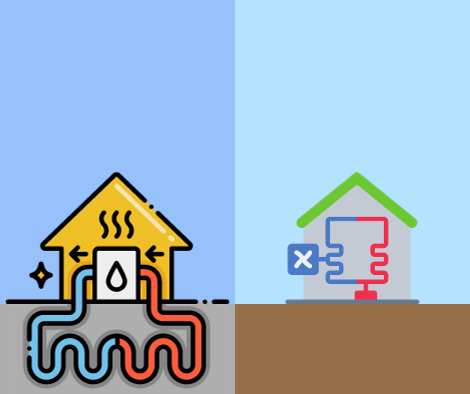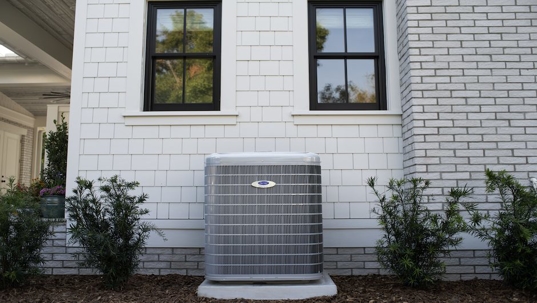While heat pumps have become increasingly more popular, a lot of people do not understand what they are or how they work. Despite the various benefits costumers rave about after choosing a heat pump, such as access to great rebates, quick installation, or reducing energy bills, the question persists: How do heat pumps achieve all of this? Well, there’s a great deal to explore there, and that’s exactly what I’ll be doing in this blog. My goal, and the goal of all of us at CPS, is to help educate our home and business owners so they can make informed decisions regarding their HVAC systems.
Believe it or not, heat pumps date back to 1856, with modern residential and commercial heating and cooling applications gaining prominence in the 1970s. Since then, ongoing research and development have significantly improved their efficiency and functionality to an outstanding degree. As they stand today, heat pump systems are one of the most sought-after HVAC systems out there. Heat pumps have many positive attributes but are particularly popular for their energy efficiency and environmental benefits. The substantial effort put into creating the best version of this technology by manufacturers has paid off; by leveraging the principles of thermodynamics, some of these innovative systems offer the most eco-friendly heating and cooling technology on the market. Heat pumps today produce significantly more heating or cooling energy than the electrical energy they consume!
Heat Pumps Simplified
A heat pump is part of your home’s heating and cooling system that includes an outdoor unit. They are powered by electricity and transfer heat, using refrigerant, from one location to another by different air or heat sources. Unlike conventional heating systems that generate heat, a heat pump absorbs energy from outside air and transfers it to the indoors. Conversely, when in cooling mode, the heat pump absorbs the heat from the indoor air and releases it through the condenser, providing you with comfort year-round.

The Heat Pump Process
Heat pumps use what we refer to as the refrigeration cycle. While the refrigeration cycle functions differently depending on the type of heat pump you have, it will always use heat transfer to function. Heat transfer works in four steps:
- Evaporation: As you likely know, evaporation is when a liquid turns into a gas, and this process is the first task of a heat pump. To accomplish this first step, the evaporator coil, typically located outside the home or building, uses a substance with high heat-absorption properties called a refrigerant. The refrigerant circulates within the system and absorbs heat from the surrounding air or ground, even in cold temperatures, then the refrigerant evaporates and becomes a gas.
- Compression: The gaseous refrigerant is compressed by the compressor to increase its temperature and pressure. The compression of the gas increases the energy of the refrigerant.
- Condensation: Next, the heated and pressurized gas reaches the condenser coil, which is located indoors. Here, the gas becomes a liquid again, and during this process, its heat is released into the indoor air to warm the space.
- Expansion: Once the refrigerant has heated the indoor air and become liquid again, it passes through an expansion valve to reduce pressure and prepare it to restart the cycle.
You’ve heard that heat pumps are energy efficient, but now you understand it! Because they move heat rather than generate it, they can be up to 400% more energy-efficient because they create more energy than the electricity they use. This technology is a massive step towards reducing greenhouse gas emissions. If the electricity in your home is powered by solar or wind, that’s even more of an incredible win for the environment! Variable-speed compressors and smart controls have enhanced the precision and adaptability of heat pumps, optimizing their operation so that most home and business owners can have the option of benefiting from this incredible technology.
Distinguishing Heat Pump Types

You may have noticed that we have mentioned more than one source from which a heat pump can absorb the heat to begin the evaporation process. That is because there is more than one type of heat pump. The two most common types of heat pumps are air-source and ground-source.
- Air-source heat pumps transfer heat between indoor air and outdoor air. These are the most common types of systems and are loved for their versatility and easy installation.
- Ground-source heat pumps, also known as geothermal heat pumps, transfer heat between the air inside your home and the ground outside. Ground source heat pumps are more expensive to install but are typically more efficient. These systems are favored by those looking to lower operating costs because they use less electricity due to the consistency of the ground temperature throughout the year.
- Water-Source Heat Pumps are a less popular option; they extract and disperse heat from water instead of air.
Heat Pump Features
- Multifaceted: Heat pumps can be used for heating and cooling. Plus, heat pump systems provide excellent indoor air quality and could negate the need for an air purifier or dehumidifier.
- Versatile: Suitable for ducted and ductless homes or businesses.
- Adaptable: They can be zoned (learn about zoning here) to allow for custom comfort in different rooms throughout the building. Mini-splits are a great way to achieve this in a home without ductwork.
- Safe: There’s no risk of gas leaks.
- Easy: Compared to other systems, heat pumps make maintenance a breeze and keep upkeep costs low.
- And, of course, they’re efficient. Your wallet and the planet will both benefit!
Are you unsure if a heat pump is right for you? We answer all of the most common questions we get about this topic in one of our previous blogs.
____________________________________________________________________________
We hope you found this article helpful and look forward to continuing to ensure your comfort and safety. Thank you for choosing CPS Heating & Cooling.
If you are in need of more information or would like to schedule a free consultation, you can reach us at (508) 501-8848 or fill out this form.

